The rise of electric vehicles marks a significant shift in the automotive landscape, bringing a fresh wave of competition among manufacturers. Among the exciting contenders in the EV sector for 2024 are the Kia EV3 and the MINI Aceman. Both vehicles offer unique features and innovations suited to different audiences. In this comparison, we'll delve into their technical specifications, innovative aspects, and performance to see which model truly stands out.
Kia EV3 vs MINI Aceman – Performance, range & efficiency compared
Compare performance, boot capacity, efficiency and price at a glance.
Find out which car is the better choice for you – Kia EV3 or MINI Aceman?
Design and Dimensions
Starting with design, the Kia EV3 presents a robust and modern SUV silhouette, measuring approximately 4300 mm in length, 1850 mm in width, and standing at 1560 mm high, with five doors for easy access. In contrast, the MINI Aceman sports a more compact form, stretching 4079 mm in length and 1754 mm in width, but slightly shorter at 1514 mm in height, also featuring five doors. Both vehicles are designed for urban agility while maintaining their distinct styling cues—Kia's bold lines against MINI's iconic cheeky curves.
Powertrain and Performance
Under the hood, the Kia EV3 is equipped with a front-wheel-drive electric powertrain, generating an impressive 204 HP and a strong torque of 283 Nm. It offers three battery capacity options: 58.3 kWh, providing an electric range of up to 436 km, or the larger 81.4 kWh version offering an extended range of 605 km on a single charge. The EV3 can accelerate from 0-100 km/h in just 7.5 seconds and reach a maximum speed of 170 km/h.
The MINI Aceman, on the other hand, showcases a slightly diverse performance range with up to 258 HP and torque peaking at 350 Nm, depending on the variant. Its battery options include 38.5 kWh and 49.2 kWh capacities, with the range varying from 309 km to 405 km. The Aceman boasts a quicker acceleration time of 6.4 seconds in its top trim and shares the same automatic transmission type featuring a reduction gearbox as seen in the Kia. The maximum speed reaches up to 200 km/h in its highest performance version, making it the sportier choice between the two.
Energy Consumption and Efficiency
In terms of energy efficiency, the Kia EV3’s consumption stands at 14.9 to 16.2 kWh/100 km, slightly higher than the MINI Aceman's 14.0 to 16.0 kWh/100 km. Both vehicles fall within the CO2 efficiency class A, highlighting their eco-friendly credentials. The lower energy consumption of the Aceman can be a significant factor for potential buyers conscious of electricity usage.
Interior and Comfort
When it comes to interior features, the Kia EV3 offers a spacious cabin focused on comfort and technology, with a trunk capacity of 460 liters, ensuring ample space for family outings or shopping trips. The five-seat configuration is practical for families. In contrast, the MINI Aceman, while offering a cozy and stylish interior, provides a smaller trunk of 300 liters, which may appeal more to urban dwellers looking for a fun and dynamic driving experience rather than raw practicality.
Innovative Features
Both vehicles come brimming with technology. The Kia EV3 integrates modern infotainment systems, advanced safety features like adaptive cruise control, and smart connectivity options, catering to tech-savvy consumers. Meanwhile, the MINI Aceman leans into its heritage with a unique take on smart driving assistance systems while emphasizing driver engagement and an agile driving experience that MINI is known for.
Conclusion: Which EV Reigns Supreme?
In conclusion, the choice between the Kia EV3 and the MINI Aceman ultimately boils down to personal preferences and driving needs. The Kia EV3 stands out with its extended range, larger cargo space, and strong performance, making it ideal for practical buyers seeking comfort on longer journeys. On the other hand, the MINI Aceman shines with its sporty performance metrics and urban-centric design, catering to those who prioritize efficiency and a fun driving experience.
As the electric vehicle market continues to grow, both models represent the manufacturers' commitment to innovation and sustainability, each carving out its distinct space in a rapidly evolving automotive world.
Here’s where it gets real: The technical differences in detail
Costs and Efficiency:
Looking at overall running costs, both models reveal some interesting differences in everyday economy.
MINI Aceman has a clearly perceptible advantage in terms of price – it starts at 25500 £, while the Kia EV3 costs 30800 £. That’s a price difference of around 5391 £.
In terms of energy consumption, the advantage goes to the MINI Aceman: with 14 kWh per 100 km, it’s slight more efficient than the Kia EV3 with 14.90 kWh. That’s a difference of about 0.90 kWh.
As for range, the Kia EV3 performs evident better – achieving up to 605 km, about 200 km more than the MINI Aceman.
Engine and Performance:
Power, torque and acceleration are the classic benchmarks for car enthusiasts – and here, some clear differences start to show.
When it comes to engine power, the MINI Aceman has a distinct edge – offering 258 HP compared to 204 HP. That’s roughly 54 HP more horsepower.
In acceleration from 0 to 100 km/h, the MINI Aceman is somewhat quicker – completing the sprint in 6.40 s, while the Kia EV3 takes 7.50 s. That’s about 1.10 s faster.
In terms of top speed, the MINI Aceman performs a bit better – reaching 200 km/h, while the Kia EV3 tops out at 170 km/h. The difference is around 30 km/h.
There’s also a difference in torque: MINI Aceman pulls slightly stronger with 350 Nm compared to 283 Nm. That’s about 67 Nm difference.
Space and Everyday Use:
Beyond pure performance, interior space and usability matter most in daily life. This is where you see which car is more practical and versatile.
Both vehicles offer seating for 5 people.
In curb weight, MINI Aceman is minimal lighter – 1720 kg compared to 1800 kg. The difference is around 80 kg.
In terms of boot space, the Kia EV3 offers evident more room – 460 L compared to 300 L. That’s a difference of about 160 L.
In maximum load capacity, the Kia EV3 performs a bit better – up to 1251 L, which is about 246 L more than the MINI Aceman.
When it comes to payload, MINI Aceman somewhat takes the win – 530 kg compared to 470 kg. That’s a difference of about 60 kg.
Who wins the race?
The MINI Aceman proves to be has a very small edge and therefore becomes our DriveDuel Champion!
MINI Aceman is the better all-rounder in this comparison.
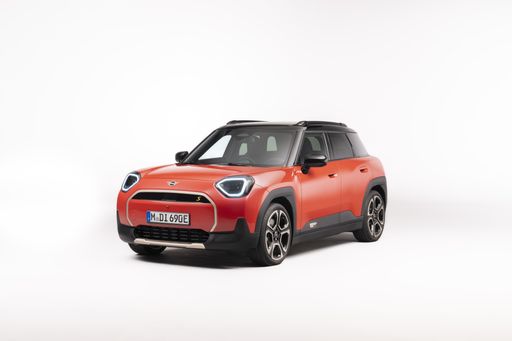 @ MINI / BMW Group Press
@ MINI / BMW Group Press
MINI Aceman
Kia EV3
The Kia EV3 arrives as a cheeky, practical electric compact that manages to feel both premium and playful, delivering crisp handling and a roomy cabin that's perfect for urban life. With smart tech, friendly styling and sensible pricing, the EV3 is the kind of car that makes switching to electric feel like a no-brainer without asking you to give anything important up.
details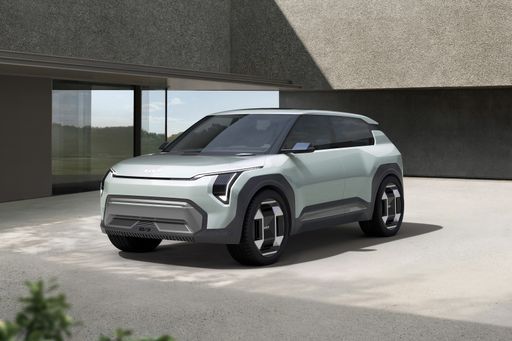 @ Kia Corporation
@ Kia Corporation
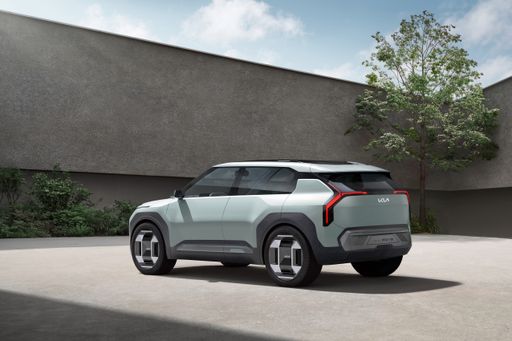 @ Kia Corporation
@ Kia Corporation
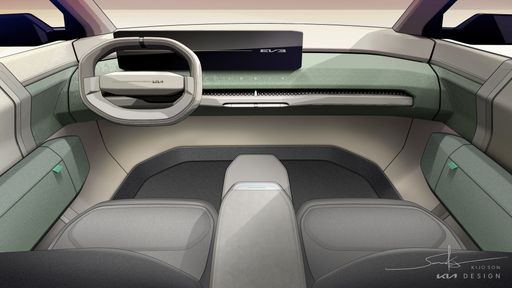 @ Kia Corporation
@ Kia Corporation
MINI Aceman
The MINI Aceman squeezes classic MINI charm into a sharper, more crossover-ready shape, trading some of the old curves for grown-up practicality while keeping the wink-and-grin personality buyers crave. Inside it's a surprisingly premium, customizable cabin that feels clever rather than cluttered, and on the road the Aceman is eager and nimble — ideal for city dwellers who want an SUV silhouette with proper fun behind the wheel.
details @ MINI / BMW Group Press
@ MINI / BMW Group Press
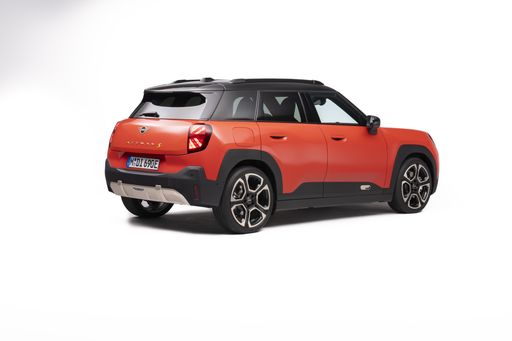 @ MINI / BMW Group Press
@ MINI / BMW Group Press
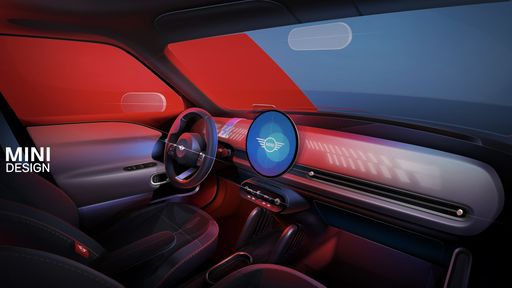 @ MINI / BMW Group Press
@ MINI / BMW Group Press
 @ Kia Corporation
@ Kia Corporation
|
 @ MINI / BMW Group Press
@ MINI / BMW Group Press
|
|
|
|
Costs and Consumption |
|
|---|---|
|
Price
30800 - 41700 £
|
Price
25500 - 36200 £
|
|
Consumption L/100km
-
|
Consumption L/100km
-
|
|
Consumption kWh/100km
14.9 - 16.2 kWh
|
Consumption kWh/100km
14 - 16 kWh
|
|
Electric Range
436 - 605 km
|
Electric Range
303 - 405 km
|
|
Battery Capacity
58.3 - 81.4 kWh
|
Battery Capacity
38.5 - 49.2 kWh
|
|
co2
0 g/km
|
co2
0 g/km
|
|
Fuel tank capacity
-
|
Fuel tank capacity
-
|
Dimensions and Body |
|
|---|---|
|
Body Type
SUV
|
Body Type
SUV
|
|
Seats
5
|
Seats
5
|
|
Doors
5
|
Doors
5
|
|
Curb weight
1800 - 1885 kg
|
Curb weight
1720 - 1825 kg
|
|
Trunk capacity
460 L
|
Trunk capacity
300 L
|
|
Length
4300 - 4310 mm
|
Length
4079 mm
|
|
Width
1850 mm
|
Width
1754 mm
|
|
Height
1560 - 1570 mm
|
Height
1514 mm
|
|
Max trunk capacity
1251 L
|
Max trunk capacity
1005 L
|
|
Payload
470 kg
|
Payload
450 - 530 kg
|
Engine and Performance |
|
|---|---|
|
Engine Type
Electric
|
Engine Type
Electric
|
|
Transmission
Automatic
|
Transmission
Automatic
|
|
Transmission Detail
Reduction Gearbox
|
Transmission Detail
Reduction Gearbox
|
|
Drive Type
Front-Wheel Drive
|
Drive Type
Front-Wheel Drive
|
|
Power HP
204 HP
|
Power HP
184 - 258 HP
|
|
Acceleration 0-100km/h
7.5 - 7.9 s
|
Acceleration 0-100km/h
6.4 - 7.9 s
|
|
Max Speed
170 km/h
|
Max Speed
160 - 200 km/h
|
|
Torque
283 Nm
|
Torque
290 - 350 Nm
|
|
Number of Cylinders
-
|
Number of Cylinders
-
|
|
Power kW
150 kW
|
Power kW
135 - 190 kW
|
|
Engine capacity
-
|
Engine capacity
-
|
General |
|
|---|---|
|
Model Year
2024
|
Model Year
2024 - 2025
|
|
CO2 Efficiency Class
A
|
CO2 Efficiency Class
A
|
|
Brand
Kia
|
Brand
MINI
|
What drive types are available for the Kia EV3?
The Kia EV3 is offered with Front-Wheel Drive.
The prices and data displayed are estimates based on German list prices and may vary by country. This information is not legally binding.
